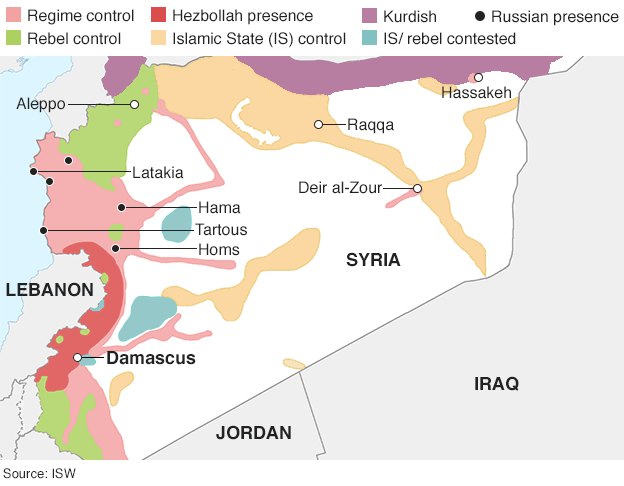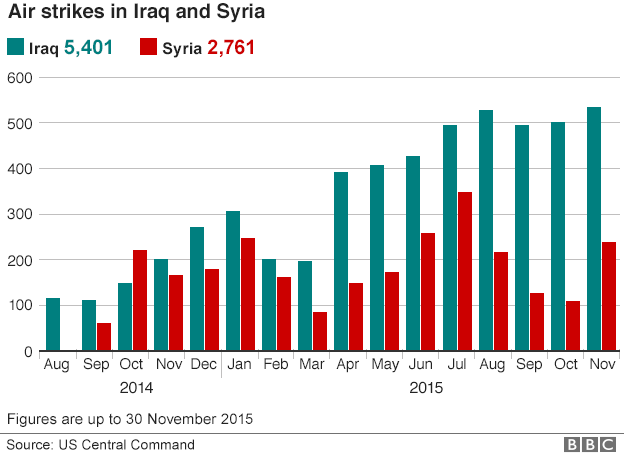Syria air strikes: What you need to know
- Published
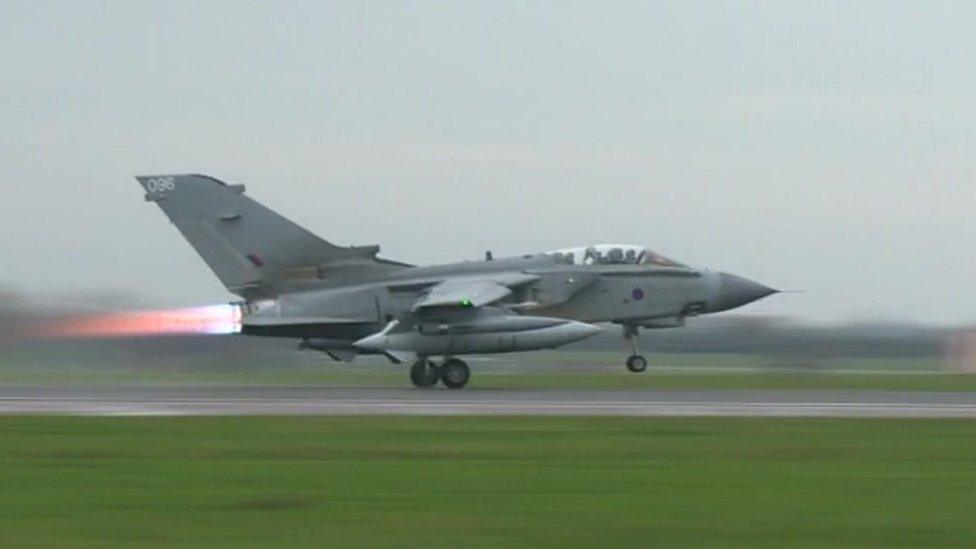
The UK has launched air strikes targeting so-called Islamic State in Syria, after MPs voted overwhelmingly for action.
The government motion, external specifically authorises air strikes "exclusively" against IS in Syria - but not deploying British troops on the ground.
Here are the key questions answered:

When did the UK begin bombing Syria?
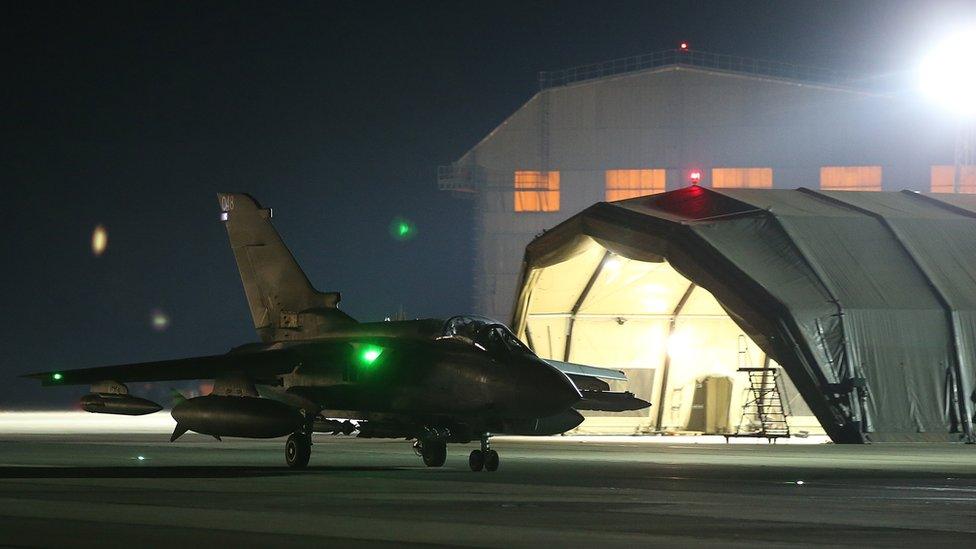
RAF Tornado jets carried out their first air strikes against the Islamic State group in Syria hours after the Commons vote, the Ministry of Defence confirmed.
Two of the four Tornados arrived back at RAF Akrotiri in Cyprus just over three hours after they left the base, landing shortly before 03:00 GMT on Thursday morning.
An MoD spokesman said the sorties had returned from the "first offensive operation over Syria and have conducted strikes".

How events unfolded
22:30: MPs vote for airstrikes
23:30: Two Tornados take off from RAF Akrotiri, each with three Paveway bombs
00:30: Two more Tornados take off with same payload
02:45: First two Tornados return without bombs
06:30: Second pair of Tornados return
Approximate times (GMT)

Why bomb Syria?
David Cameron on IS: "They have already tried to attack us"
David Cameron says IS (also known as ISIS, ISIL and Daesh) poses a terror threat to British people, and so the UK must strike IS in its "heartland" - Syria.
He argues the UK has a moral obligation to get involved, and should not be "content with outsourcing our security to allies".

Who was against it and why?
Jeremy Corbyn said he opposed Syria air strikes because they will not ''solve the problem that is there''
MPs who opposed the plan, including Labour leader Jeremy Corbyn, argued that British bombing in Syria will inevitably lead to civilians being killed, no matter how targeted the campaign.
Mr Corbyn wanted the government to focus on finding a political solution, and cutting off IS funding streams.
The SNP said it was concerned there was no effective ground support in place to take and hold territory, and no reconstruction plan.
Other MPs who were opposed warned against repeating mistakes made in the Iraq and Libya conflicts, and questioned how bombing in Syria would prevent attacks from home-grown terrorists inspired by IS.

What is an air strike?
According to the Oxford English Dictionary, an air strike is 'an attack made using aircraft'.
The Ministry of Defence has different definitions of air strikes depending on whether they are UK or coalition strikes, and whether they are related to a pre-planned target or emerge during combat operations.
The MoD's varying definitions mean that an attack that is classified as one air strike could involve multiple weapons, locations or aircraft.

Will UK air strikes work?
John Simpson examines the impact of air strikes in the battle against IS
The UK has precision laser-guided Brimstone missiles, which the government argues will help the coalition reduce civilian casualties, and sustain the campaign.
The Brimstone missile has what is known as a "fire and forget" capability, which uses a wave radar seeker to lock on to a moving target.
The MoD said 93 Brimstone missiles - each costing more than £100,000 - were fired in the year to September in military operations in Iraq.
Paveway IV bombs were deployed by the RAF's Tornado jets deployed to carry out the first British air strikes in Syria.
These "smart weapons" are the most modern and accurate precision-guided munitions in the RAF inventory, and are commonly used against static targets.
However, a number of people, including the prime minister, have conceded that air strikes alone are not enough to defeat IS.
Defence think tank, the Royal United Services Institute, external (Rusi), has said IS will only be dislodged by "credible Arab ground forces prepared to fight block by block".
The RAF's contribution would "not make much difference" to the coalition's strike capability, but the availability of British Tornado jets would provide "a greater range of options", it concluded.

What is the UK's plan for Syria?
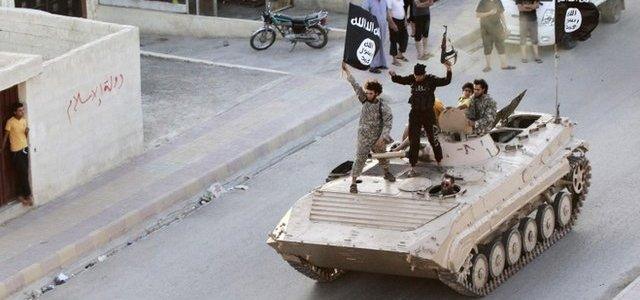
Islamic State militants in Raqqa, Syria, which the government says is one of its main strongholds
Mr Cameron has set out a seven-point plan, external for the UK's proposed involvement in Syria, which involves military, diplomatic and humanitarian action.
He has ruled out British "boots on the ground" - but insists the RAF's specialist bombing capabilities are needed by allies to "degrade and defeat" IS. He says there is strong legal justification on grounds of self-defence and the recent UN Security Council resolution.
The UK would also help with the transition to a new "inclusive" Syrian government through diplomatic means, he says. He is clear that this would mean the departure of President Assad, and "moderate opposition" would be crucial to its success.

How long could the UK be involved?
There is no definitive timescale. Some claim IS could be defeated within months - or even weeks - with the right strategy.
But others, including Jeremy Corbyn, say previous conflicts in the Middle East raise doubts that Britain could ever help secure any "lasting defeat" of IS - or avoid what Barack Obama termed "unintended consequences", such as giving rise to new terror groups.
The end goal, Mr Cameron says, is the "eradication" of IS, and a new government that represents all Syrian people - a mission which would require "patience and persistence".

Do Syrian civilians want Britain to join in with air strikes?
This is a difficult question to answer - the situation on the ground makes it hard to reliably gauge Syrian public opinion, but a number of Syrians have spoken to the BBC about their reaction to the British decision.
"All the world is bombing Raqqa and the UK will not make any change in the situation," said citizen journalist group 'Raqqa is being Slaughtered Silently', which is based in the IS stronghold.
However, the BBC's chief international correspondent Lyse Doucet, in the capital Damascus, says most Syrians are weary of fighting and would support a concerted effort to end the war.
"Those who back the government want Britain to co-ordinate with President Assad's forces to fight extremist groups. Those who don't want greater international action to remove him from power," she said.
She says Syrian newspapers on Wednesday made no mention of possible UK intervention. They led with an interview in which President Bashar al-Assad claimed air strikes by Russia - which backs his government - were tackling jihadists, while US strikes were not effective.

What could the impact be on ordinary Syrians?
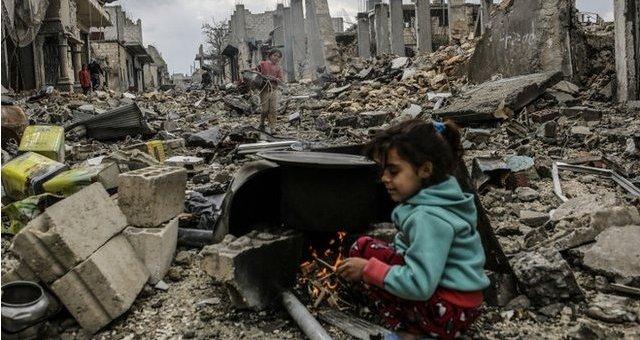
More than three million people have already left Syria as a result of the fighting, in one of the biggest forced migrations since World War Two.
Those still living in areas of conflict face being caught up in clashes between the Syrian government, opposition factions and jihadists groups.
There have also been reports of civilians killed by Russian air strikes in Syria and US strikes in Iraq. Mr Cameron has said that Britain's Brimstone missiles are so precise they will be able to avoid civilian casualties.
However, the Syrian Observatory for Human Rights, external warns that IS fighters are living "almost totally" among civilians, meaning that avoiding civilian casualties will also depend on good intelligence.

Why has RAF Akrotiri been used?
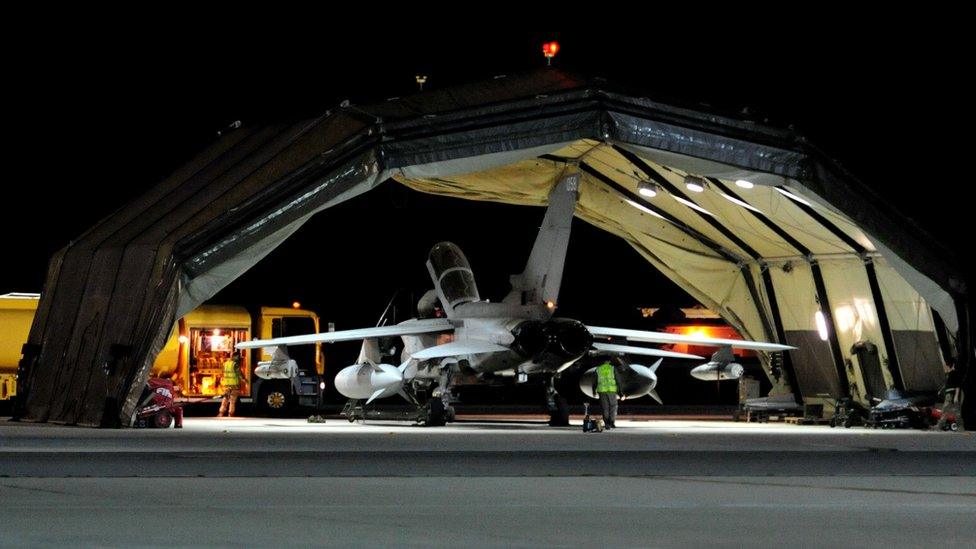
RAF Akrotiri in Cyprus is one of the British sovereign bases located in the eastern Mediterranean Sea.
It has played a key role in Operation Shader - the military intervention against IS in Iraq - with some 860 personnel involved in the mission, according to the MoD.
Its fighter bombers began attacking IS targets in Iraq in September last year, when MPs approved air strikes there.
The base's hardware includes eight Tornado GR4s, a Voyager refuelling aircraft and unmanned Predator drones armed with Hellfire missiles. The GR4s carry a range of munitions including Paveway IV guided bombs and precision-guided Brimstone missiles.'
Six Typhoon jet fighters from RAF Lossiemouth in Scotland have also been sent to Cyprus to take part in airstrikes in Syria.

Are there really 70,000 moderate Syrian fighters?
Who will fight IS on the ground?
David Cameron has said there at least 70,000 Syrian opposition fighters - principally the Free Syrian Army - with whom the UK could co-ordinate attacks on IS.
That is based on Joint Intelligence Committee figures which draw on Foreign Office, open source and intelligence agency assessments, officials say.
Independent experts say the 70,000 figure is broadly accurate, but question how many could be persuaded to fight IS instead of the Syrian regime, let alone be moulded into an effective force.
BBC security correspondent Frank Gardner says that brings into question whether the ground force part of David Cameron's wider strategy is actually viable.

How might IS militants respond to strikes?
IS group leaders have called on followers to carry out terror attacks against Western countries - particularly those involved in coalition air strikes.
Those opposed to air strikes have warned about potential repercussions, including former UK ambassador to Syria, Peter Ford, who said "the inevitable blowback on our streets will be severe".
However, Mr Cameron argues the UK is already at severe threat level - and doing nothing could make the country even more of a target. Taking action will "degrade that threat over time", he says.

What action has the UK taken against IS already?
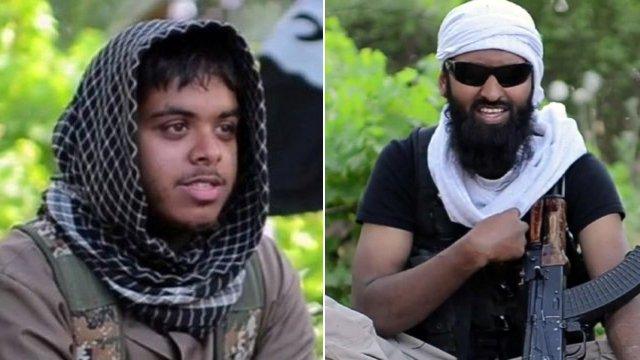
Reyaad Khan, from Cardiff and Ruhul Amin, from Aberdeen, were killed by a British drone strike in Syria
The UK has deployed air power to Iraq in the form of eight RAF Tornado aircraft. They operate out of a British base in Cyprus and have launched guided bombs aimed at IS targets.
Reaper drones, which are remotely piloted by RAF crews in the UK, have also carried out surveillance and launched missiles at IS targets in Iraq, external.
British pilots have also been embedded with coalition air forces, and two British jihadists in Syria were killed by an RAF drone strike in September, which David Cameron said was a lawful "act of self defence".

Why has the UK been bombing IS in Iraq, but not Syria?
In 2013, MPs voted against possible UK military action against President Assad's forces in Syria, after evidence chemical weapons were used against civilians.
Then-Labour leader Ed Miliband said that the House of Commons had spoken "for the people of Britain" through that vote, adding the public "wanted us to learn the lessons" of the Iraq War.
Just over a year later, MPs overwhelmingly approved UK air strikes in Iraq - this time specifically against IS militants - and Defence Secretary Michael Fallon told the BBC the parliamentary vote followed a request for help from the UN by the Iraqi government.
MPs have now voted on extending that action to Syria.
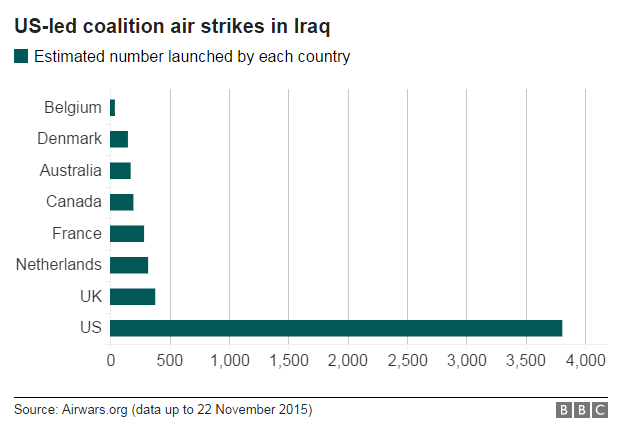

What is going on in Syria?
Who’s fighting whom in Syria? Explained in 90 seconds
Syria has been embroiled in a bloody armed conflict for nearly five years. More than 250,000 Syrians have been killed, and 11 million made homeless.
What started as pro-democracy Arab Spring protests in 2011 spiralled into a civil war between President Bashar al-Assad's government forces and opposition supporters.
In the chaos, jihadist group IS moved in over the border from Iraq and claimed territory. The US, Russia, France and other world powers have entered the fray, adding to an already complex web.
